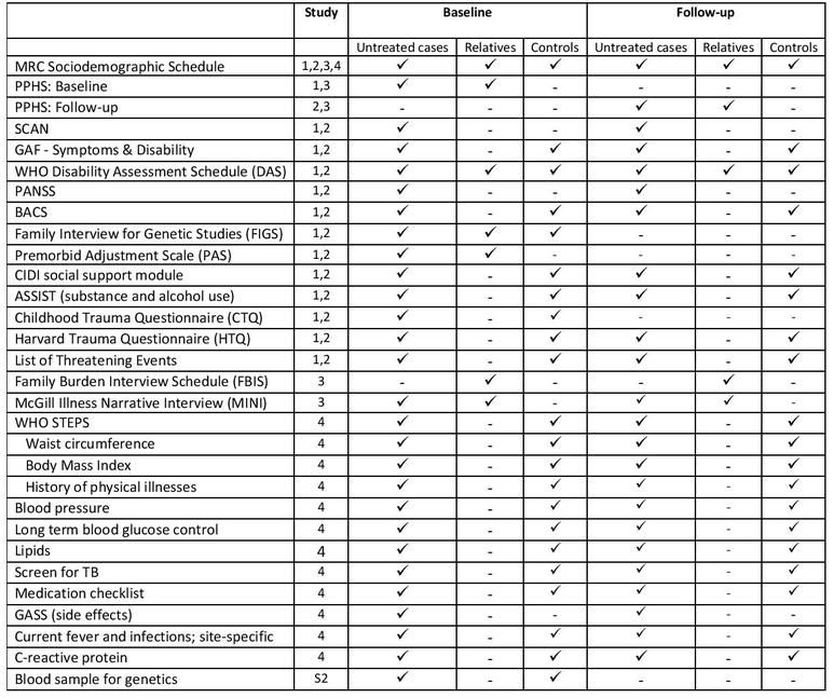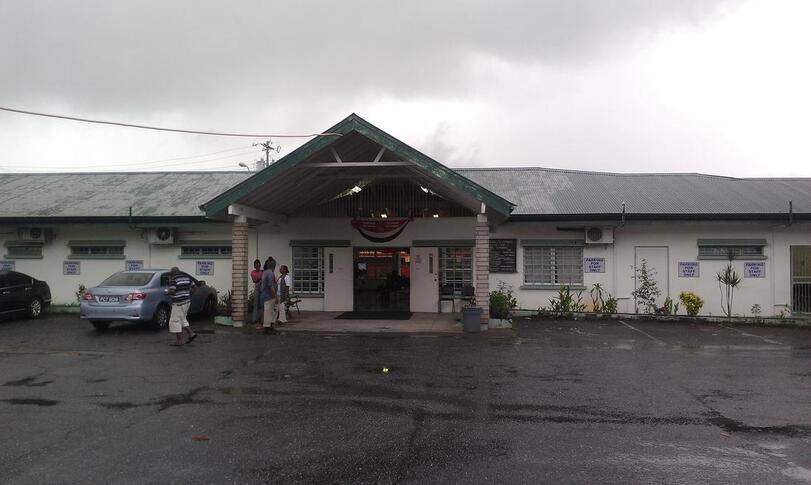Overview of INTREPID II
|
INTREPID II is a research programme studying the epidemiology, phenomenology, aetiology and outcome of psychotic disorders in diverse settings. INTREPID stands for the INTernational REsearch Programme on Psychoses In Diverse settings and its mission is to investigate psychotic disorders in 3 settings: Nigeria, India, and Trinidad. It builds on previously-developed methods for the study of schizophrenia and other psychoses from the INTREPID I pilot study.
In Nigeria, the catchment area includes the following Local Government Areas: Idaban North East, Ibadan South East, and Ona-Ara, in Oyo State. In Trinidad, the catchment area covers the municipalities of Arima, Tunapuna-Piarco, Chaguanas, Port of Spain, San Juan/Laventille and Diego Martin. In India, the catchment area consists of Chengelpettu, Uthiramerur and Maduranthakam taluks, in the state of Tamil Nadu, South India. Learn more about each study site and catchment area by clicking on the links below: |
A street in Tamil Nadu, India
|
Aims of the research
The overall aim of the five-year research programme is to investigate the variability - in incidence, presentation, outcome, and impact - of psychotic disorders in diverse developing countries. The programme takes place in sites in three countries (India, Nigeria, Trinidad) and consists of four inter-connected studies, aiming to:
(1) investigate the incidence and presentation of untreated psychotic disorders in each site and associated risk factors;
(2) investigate the 2-year course and outcome of psychotic disorders and associated factors;
(3) investigate (a) help-seeking and (b) the impact of psychotic disorders on individuals and families, using a combination of quantitative and qualitative approaches;
(4) investigate the types and prevalence of physical health problems and related risk markers.
(1) investigate the incidence and presentation of untreated psychotic disorders in each site and associated risk factors;
(2) investigate the 2-year course and outcome of psychotic disorders and associated factors;
(3) investigate (a) help-seeking and (b) the impact of psychotic disorders on individuals and families, using a combination of quantitative and qualitative approaches;
(4) investigate the types and prevalence of physical health problems and related risk markers.
What INTREPID II adds
During the pilot project, we developed an extensive network of biomedical and alternative providers as well as local key informants, allowing us to enroll incident cases who utilise health services, as will as detect untreated cases who do not present to formal health services and who may otherwise have been excluded. This will ensure that our sample is as representative as possible, and provide a more comprehensive estimate of the incidence of psychotic disorders.
Instruments that have been tested and adapted in the pilot study (INTREPID I) are used to collect data to address each of the aims above. The use of consistent methods across the three sites is key to enable valid cross-site comparisons.
Instruments that have been tested and adapted in the pilot study (INTREPID I) are used to collect data to address each of the aims above. The use of consistent methods across the three sites is key to enable valid cross-site comparisons.
|
The INTREPID II study also includes matched controls, allowing us to compare outcomes for people with psychosis with those of their peers in the same setting.
Findings from the INTREPID II programme will further our understanding of the aetiology, presentation and course of psychotic disorders across different populations. The results will inform service delivery and prevention efforts in these settings as well as for diaspora populations living in the UK |
Hear from the INTREPID team...
We asked INTREPID co-investigator Dr. Alex Cohen, for his thoughts on (a) the most important research question that INTREPID II is investigating, (b) key challenges in doing this type of research, (c) how the INTREPID I pilot study informed his current work, (d) what services exist for psychosis in his setting, and (e) how the INTREPID II evidence can help to improve the lives of people living with psychosis.
Interview with Dr Alex Cohen, co-investigator of INTREPID II
Listen to the thoughts of the principal investigators in India, Nigeria and Trinidad on the site-specific pages.
Research Design and Methods
In each of the three sites, we will identify, assess, and follow at 2 years, cohorts of 240 untreated (incident) persons with a psychotic disorder and, where possible, a close relative of each person, as well as 240 matched controls.
With participants' consent, extensive data will be collected by trained interviewers on clinical, social and biological measures, for both cases and controls. In addition, relatives of the persons with psychoses will be interviewed to collect information about care pathways, family burden and help-seeking. All participants will be followed up 2 years after their inclusion in the study, allowing us to track the course and outcomes of psychotic disorders.
The table below represents the instruments used for collecting data by the interviewers for each of the 4 studies described above:
With participants' consent, extensive data will be collected by trained interviewers on clinical, social and biological measures, for both cases and controls. In addition, relatives of the persons with psychoses will be interviewed to collect information about care pathways, family burden and help-seeking. All participants will be followed up 2 years after their inclusion in the study, allowing us to track the course and outcomes of psychotic disorders.
The table below represents the instruments used for collecting data by the interviewers for each of the 4 studies described above:
A full protocol will be published shortly and made available on the "Publications" section of the website. In the meantime, for full details of the study design please feel free to contact the INTREPID team.



